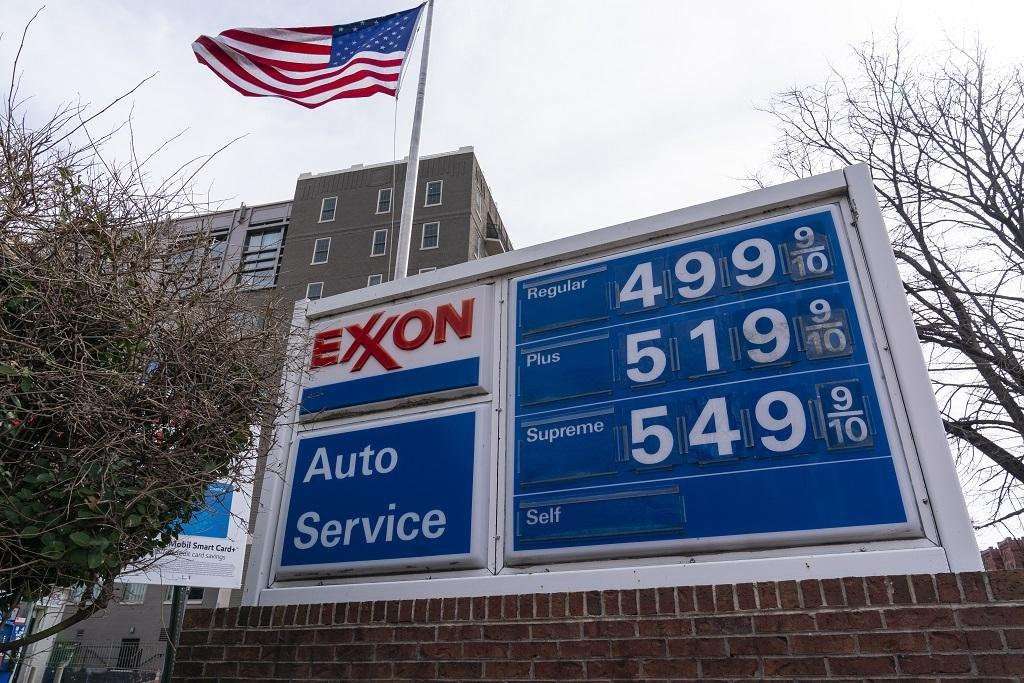× Expand Alex Brandon/AP Photo Prices for a gallon of gasoline are posted on the sign of an Exxon station, March 7, 2022, in the Capitol Hill neighborhood of Washington.
Sen. Bernie Sanders recently introduced the Ending Corporate Greed Act. The act would impose a 95 percent tax rate on the excess profits of large corporations that earn more than $500 million a year. Excess profits are defined as profits that exceed the corporation’s average profit level from 2015 to 2019, adjusted for inflation. This excess profits tax will be imposed over and above the normal corporate tax of 21 percent, but the two rates will be coordinated so that the maximum combined tax rate will not exceed 75 percent of income for any year. The tax will be a temporary emergency measure, applying only in 2022, 2023, and 2024.
Like many of Sen. Sanders’s ideas, this sounds radical (95 percent taxation!), but in fact it is not. The Sanders proposal is entirely in line with both the tradition of U.S. corporate taxation and with its underlying economic and regulatory rationales.
First, the history: During the First and Second World Wars and the Korean War, the United States implemented a broad-based windfall profits tax. During World War II, the tax rate reached as high as 95 percent, which ensured that companies could not profiteer off the war. In addition, the United States enacted a windfall profits tax on oil and gas companies as recently as the mid-1980s. The idea underlying these prior efforts was that companies should not earn “windfall” profits, namely profits that result from external circumstances such as wars or extraordinary rises in the price of certain commodities, and not from their own efforts.
The current combination of the COVID-19 pandemic, which raised the profits of companies like Amazon to record levels, and the war in Ukraine, which did the same to oil and gas companies, fully justifies reviving the windfall profits tax. The Sanders proposal is essentially identical with the Word War II version of the tax, including the reliance on a pre-war average, the 95 percent rate, and the limitation on the overall effective tax rate.
Second, the economics: Economists distinguish between normal returns to capital, which are subject to competition and therefore are relatively constrained, and rents or excess returns, which are not. Normal returns are a legitimate target of taxation, but the tax rate should not be too high because a high rate would deter companies from socially useful investments. Excess returns, on the other hand, are those that are not subject to competition. They are the returns a company that enjoys quasi-monopoly status like Amazon or Google, or quasi-oligopoly status like ExxonMobil or Chevron, earns from their access to a unique resource and their domination of the market. Because excess returns are not subject to competition, taxing them at even very high rates will not deter investments because the remaining after-tax profit will still be a windfall. The Sanders proposal correctly distinguishes between normal profits taxed at the regular 21 percent rate and extraordinary profits taxed at 95 percent.
Finally, the regulatory aim: The corporate tax is not primarily about revenue (it is less than 10 percent of total federal tax revenue) or redistribution (it is unclear who bears the burden of the normal corporate tax in competitive conditions, since some of it can be shifted to employees or to consumers, while a tax on excess profits falls entirely on shareholders). The corporate tax is primarily about regulating large corporations by giving them tax incentives (for example, green-energy credits) and disincentives (like the proposed tax penalties for investing in Russia).
The Sanders proposal is designed to regulate corporations that take advantage of the current inflationary wave, the pandemic, and the war in Ukraine to increase their profits way above their previous average profit. Ideally, it would raise little revenue but induce a fall in prices, which would benefit everyone except corporate shareholders. But if such a price decrease does not happen, the tax would raise significant revenue (according to Sen. Sanders, an estimated $400 billion in one year from 30 of the largest corporate profiteers alone). These revenues could be used to subsidize working families that suffer the effects of rising prices, and to accelerate the shift to renewable energy so that the economy is less at the mercy of the oil companies, domestic and foreign.

Illustrious-Mouse-36 on April 18th, 2022 at 14:31 UTC »
I'm in favor of taxation over printing money any day.
Diluting the dollar hurts everybody taxation mildly inconveniences the rich.
Mega-Balls on April 18th, 2022 at 14:12 UTC »
We also need to bust monopolies and trusts. These companies are working together to raise prices, which is illegal.
Palestbycomparisoned on April 18th, 2022 at 14:00 UTC »
You could tax all stock buy backs, ceo stock options and company dividends to avoid companies pushing excess cash into these transactions rather than paying tax on them.